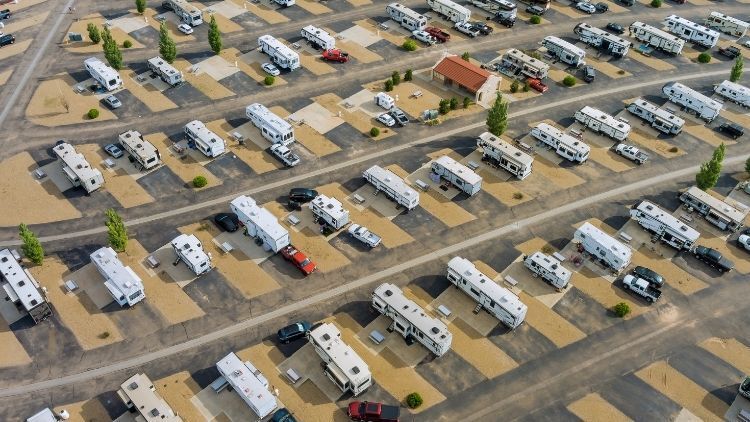
Are you considering hitting the road or finding your perfect home on wheels? RVing has become a popular lifestyle choice for families, retirees, and adventure-seekers alike. Whether you're a resident or new to the area, understanding the various types of RVs and the best RV storage options near Santa Rosa will help you select the perfect one for your adventures. Let's dive in!
RVs generally fall into two main categories: motorized and towable. Motorized RVs come equipped with their engines, providing you with the freedom to drive and live in one unit. Towable RVs, on the other hand, require a separate vehicle to be hitched, offering a different level of flexibility and often a lower price tag. Let's break down the details.
Motorized RVs are great if you want everything in one package. Here's a closer look at the main types:
These are the largest and most luxurious RVs out there. They resemble large buses and are ideal for full-time living or extended road trips. They come with spacious interiors, residential-style kitchens, and plenty of storage.
Pros: tons of space and high-end features. Cons: expensive, heavy on fuel, and difficult to park in tight spaces.
Class B RVs are the smallest motorized options, built on a van chassis. They're easy to drive and park, making them great for solo travelers or couples who want simplicity and mobility.
Pros: nimble, fuel-efficient, and can even double as a daily driver. Cons: limited living space, smaller kitchens, and fewer amenities.
Here's a term you'll often hear in the RV world: Class B+. While it sounds like a middle ground between B and C, it's more of a marketing term. Technically, Class B+ RVs are smaller Class C motorhomes without the over-cab sleeping area. They're built on the same chassis as Class C RVs, offering more living space than a camper van but still reasonably easy to drive.
Class C RVs are built on a truck chassis and usually have a distinctive over-cab sleeping area. They're an excellent option for families who want a mix of space and drivability.
Pros: good balance of features and maneuverability, more affordable than Class A. Cons: less spacious than Class A and typically smaller holding tanks.
Super Cs are a step up from standard Class C RVs, built on commercial truck chassis, such as Freightliners. They're designed to handle heavier loads and often come with powerful diesel engines. Super Cs are great if you need serious towing capacity or want a more rugged feel without jumping into the Class A price bracket.
Towable RVs allow you to unhitch and explore with your tow vehicle, making them ideal for day trips. Here's a rundown:
Travel trailers come in a wide range of sizes and layouts. They're one of the most popular RV types, offering something for everyone. However, most travel trailers require an SUV or truck to tow safely. While small trailers, such as teardrops, can be towed by some larger cars, standard travel trailers typically need a vehicle with substantial towing capacity.
Pros: versatile and budget-friendly. Cons: requires a capable tow vehicle and some practice to tow confidently.
These trailers hitch to the bed of a pickup truck, providing better stability and often more living space. They're great for full-time residents or those who want a spacious home on wheels.
Pros: spacious, often with high ceilings and multiple levels. Cons: it requires a truck with a fifth-wheel hitch, and towing can be tricky for beginners.
Toy haulers come with a garage space for things like motorcycles or ATVs, making them a favorite among adventure seekers.
Lightweight and easy to store, pop-ups are a budget-friendly option that folds down when not in use.
Tiny but mighty, these are great for minimalists who want a cozy place to sleep.
Truck campers fit into the bed of a pickup truck, making them great for off-grid adventures and quick getaways.
Choosing the right RV comes down to your needs and preferences. Think about how you plan to use your RV—weekend getaways, full-time living, or something in between—and match that to the features you value most.
Beyond the purchase price, factor in maintenance, insurance, fuel, and repairs. Some RVs are more cost-effective than others in the long run.
Larger rigs can be intimidating to drive, while smaller ones are easier to handle. Think about the places you want to explore.
Some neighborhoods have rules about parking RVs at home, and larger models may require dedicated storage. Research RV storage options near Santa Rosa if you need a safe place to keep your RV.
If you're opting for a towable, ensure your vehicle is rated to handle the weight. Always double-check your vehicle's towing capacity to stay safe on the road.
Motorhomes are all-in-one, which makes them convenient but typically more expensive. Travel trailers let you unhitch and use your vehicle for errands and day trips. It's all about what fits your budget and lifestyle.
Before you buy, get a pre-purchase inspection to avoid costly surprises. Learn basic maintenance, such as checking for leaks and keeping tires and seals in good condition. And don't forget to practice driving or towing before your big adventure!
Do I need a special license to drive a recreational vehicle (RV)?
-In most cases, a regular driver's license is sufficient, but please check your state's specific requirements.
What's the difference between Class A, B, and C?
-It mostly comes down to size and features.
Which RV is best for full-time living?
-Class A or Fifth Wheel Trailers are popular choices, but it depends on your budget and lifestyle.
There's an RV out there for everyone, whether you're chasing sunsets on the weekend or planning to live on the road full-time. Take the time to explore your options, ask questions, and think about how you want to travel. When it comes to keeping your RV safe and secure, be sure to explore RV storage options near Santa Rosa.